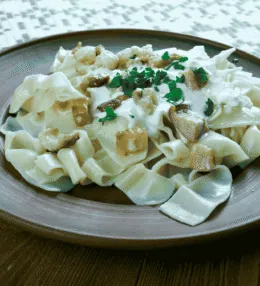
- View
Table of Contents
ToggleLoukaniko, the traditional Greek sausage, is a dish that captures the rustic flavours of Greece, blending savoury spices with a hint of citrus. This sausage is as versatile as it is flavourful, served grilled or pan fried, sliced as part of a meze platter, or even as a comforting addition to stews.
Loukaniko is more than just a sausage; it’s a representation of Greek culinary heritage, often made in small villages with family recipes passed down through generations.
Want to dive deeper into Greek Cuisine? Don’t miss our post on 39 Traditional Greek Foods to Try
What Is Loukaniko?
Loukaniko is a Greek sausage made primarily from pork, though sometimes lamb is used for additional depth. What makes it distinct from other sausages is its unique seasoning, which often includes orange zest and a blend of aromatic spices like fennel and coriander.
The sausage is then dried, smoked, or cured, giving it a robust, rich flavour that stands out even in the simplest preparations. Loukaniko is typically served as part of a traditional Greek meal, where it’s paired with tangy yogurt, crusty bread, or grilled vegetables, highlighting its complex yet approachable flavours.
This sausage is commonly enjoyed year round but holds a special place in family gatherings and celebrations, where it brings a touch of tradition to the table. The combination of savoury meat, spices, and the subtle brightness of citrus makes Loukaniko both comforting and refreshing, embodying the essence of Greek home cooking.
Ingredients and Taste
The ingredients in Loukaniko are simple but chosen carefully to create a sausage that’s both flavourful and uniquely Greek. Pork, often sourced locally, provides a rich, juicy base, and sometimes lamb is added for a more layered flavour.
What sets Loukaniko apart is the seasoning, orange zest adds a bright, citrusy note that balances the richness of the meat, while spices like coriander and fennel seed bring warmth and a slight earthiness. These flavours meld together during curing, infusing the sausage with a distinctive taste.
When cooked, Loukaniko releases an inviting aroma that’s as enjoyable as its flavour. The taste is savoury with a hint of sweetness from the orange zest and a lingering warmth from the spices.
The texture is slightly coarse, allowing each bite to feel hearty and satisfying. Grilled or fried, the sausage develops a light crispness on the outside, which gives way to a tender, juicy interior. Each bite offers a taste of Greece’s rich, culinary tradition, where flavours are bold yet harmonious, never overwhelming.
A Taste of History
Loukaniko has deep roots in Greek history, tracing back to ancient times when the Greeks were among the first to preserve and season meat as a way to store food through the seasons. Sausages were an essential part of their diet, and over time, each region developed its own unique recipes.
The addition of orange zest to Loukaniko is thought to have originated in regions where citrus trees were abundant, adding a local touch to the sausage that has since become a hallmark of Greek flavour.
In Greek villages, sausage making was a communal activity, often done in the colder months as families prepared for winter. Loukaniko, along with other preserved meats, would be made in large batches and stored to provide nourishment during the leaner months.
Today, Loukaniko continues to be enjoyed not only as a reminder of these traditions but as a beloved dish that celebrates the simplicity and richness of Greek ingredients.

Loukaniko (Greek Sausage)
Equipment
- Mixing bowls
- Sausage stuffer
- Baking tray lined with parchment paper for roasting
Ingredients
- 1 kg pork shoulder coarsely ground
- 2 cloves garlic minced
- 1/2 cup dry red wine
- Zest of 1 orange
- 1 tbsp dried oregano
- 1 tbsp fennel seeds toasted and ground
- 1 tsp smoked paprika
- 1/2 tsp ground cumin
- 1 tsp salt
- 1/2 tsp black pepper
- Natural sausage casings soaked and rinsed
Instructions
- In a large mixing bowl, combine the ground pork, minced garlic, and red wine. Mix gently but thoroughly to ensure the meat absorbs the flavours of the garlic and wine. This will also keep the sausage moist.
- Add the orange zest, oregano, ground fennel seeds, smoked paprika, cumin, salt, and black pepper to the meat mixture. Mix by hand, kneading until the spices are evenly distributed. This step is essential to achieve the characteristic taste of Loukaniko.
- Cover the bowl with plastic wrap and refrigerate the seasoned meat for at least 1 hour, or preferably overnight. This resting time allows the flavours to meld and deepen, giving the sausage a richer taste.
- While the sausage mixture rests, prepare the sausage casings. Soak the natural casings in warm water for about 30 minutes to make them pliable, then rinse them thoroughly to remove any excess salt. This will make them easier to handle when stuffing.
- Attach a sausage stuffer to your grinder or mixer. Feed one end of the casing onto the nozzle, leaving a few inches hanging off. Carefully begin to feed the meat mixture into the casing, ensuring it is evenly packed without air bubbles.
- As you stuff the sausages, twist the casing every 5–6 inches to form individual links. Be gentle to avoid bursting the casing, and take your time to ensure each link is consistent. Once all the meat is stuffed, tie off the ends of each link.
- To cook, preheat your oven to 180°C (350°F). Place the sausages on a baking tray lined with parchment paper, and roast for 25–30 minutes until the sausages are browned and cooked through. Alternatively, you can grill them over medium heat for a smoky flavour, turning occasionally.
- Serve the Loukaniko hot, garnished with fresh lemon wedges for squeezing. This sausage pairs wonderfully with a side of Greek salad, roasted potatoes, or warm pita bread. A drizzle of extra virgin olive oil over the cooked sausage enhances the flavour and adds an authentic Greek touch.
Nutrition
You May Also Like










